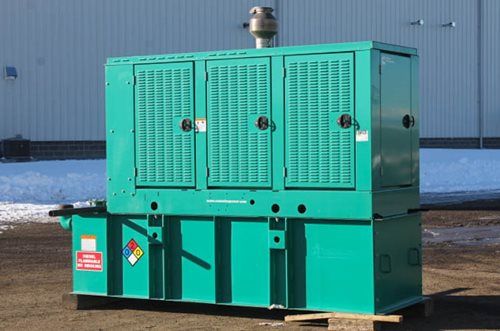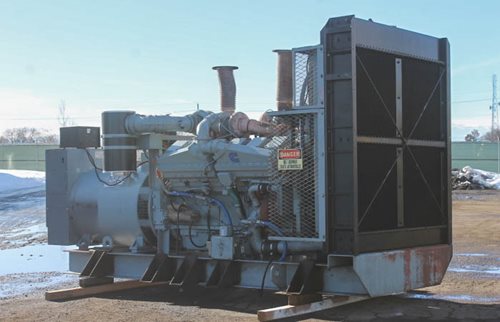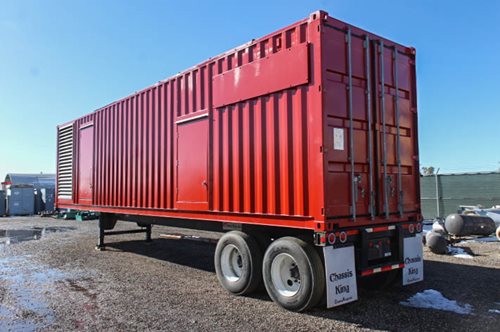|
 There are many great benefits to purchasing a pre-owned or low-hour used generator. Companies that are both large and small routinely purchase generators that are pre-owned units because it is often the most cost-effective way to buy high-quality industrial assets and/or heavy equipment. However, there are also a number of factors and considerations that must be taken into account before making the actual purchase, which is of course the main purpose of this article. There are many great benefits to purchasing a pre-owned or low-hour used generator. Companies that are both large and small routinely purchase generators that are pre-owned units because it is often the most cost-effective way to buy high-quality industrial assets and/or heavy equipment. However, there are also a number of factors and considerations that must be taken into account before making the actual purchase, which is of course the main purpose of this article.
To begin, it all starts with choosing the right generator for your specific power requirements. For more information on that, see our other article on determining the size of generator. Once you have determined the size you will need, then it's time to start looking at a number of other factors.
Some of the key factors to consider when buying a used generator of any type (diesel, natural gas, electric, propane, gas, etc.):
-
Age, Hours, and Usage
-
Manufacturer history and reputation
-
How well it has been maintained
-
Physical wear and tear on the unit
-
How it performs in a Load Test
-
Who you are purchasing it from (broker vs distributor)
Age, Hours, and Usage:
When shopping for a reliable used generator to buy, one of the first things you can try to check is the hours, age and history of the generator set. First, find out how many hours it has on it, generator engines are usually just like a car and have an odometer reading. It may also be helpful to know what it was used for, and whether it was for the ongoing generation of electric power (prime/continuous), or if it was it a standby machine. A generator that has been used as a standby or backup power source will typically be better maintained and have much less wear than one used as a prime power source. However, be aware that there are many times when the age and usage information is simply not available. Dealers typically acquire generators from things like foreclosures, auctions, and so forth, and they often have no idea where it came from or what it was used for in the past. In those cases, the reputation and technical expertise of the seller is often much more important anyway, since they will (hopefully) be the ones who inspect, tune, rebuild, test, and fix anything that might be wrong before reselling it.
 Manufacturer History and Reputation: Manufacturer History and Reputation:
While the make and model are not always that critical, the generator manufacturer's history and reputation should definitely play a role when your company is choosing to rely on used machinery. Since you are purchasing a product that you will most likely come to rely on for electric power at some point (whether you are buying a prime or emergency standby generator), now is not really the time to be cutting corners or taking big chances on unknown brands. It's always a good idea to go with a trusted manufacturer who has a reputation for producing equipment that can stand the stress and test of time, and so you can find parts and service that's readily available if necessary. Industry veterans like Caterpillar, Cummins, Detroit Diesel, Onan, Kohler, John Deere, and a handful of others all have a long history of producing high quality equipment that will last for years and years when properly maintained.
How Well has it been Maintained?
This is another area where you might not be able to get much historical information, but you can and should check the seller's current level of knowledge on maintaining and repairing diesel engines, power units, transfer switches, and generator ends. You can gauge the seller's current knowledge and expertise in regards to that type of maintenance by simply asking about the procedures they use; if they install and de-install, have dyno-testing equipment on site, have a certified staff of technicians in-house, electricians on staff, and so forth. This is important, since a well-maintained and/or rebuilt generator set will have a much longer life than one that is simply changing hands from a broker to end-user, or end-user to end-user.
Physical Wear and Tear:
-
Visual Inspection
Your next action should be a visual inspection. A generator, like any mechanical device, suffers wear and tear during operation. Check all mechanical components for wear or fatigue. See if any of the mechanical parts have any cracks or corrosion built up. If any part is found to be questionable, it should be replaced, ideally with components recommended by the manufacturer. Every now and then you might run across a generator set that has a different manufacturer's engine and/or end than it originally came with. While that is a sign that something was replaced and it was obviously worked on at some point, it doesn't necessarily have to be a deal breaker as long as the individual components were installed by a certified technician, tested extensively, and it stills come with some type of guarantee from the dealer.
-
Replace bearings and bushings
If this hasn't already been done by the dealer, the bearings and bushings should all be replaced, regardless of their function or condition. This is to ensure that these parts do not cause any damage due to their failure while running the generator set. The bearings and bushings are subject to stress during the generator operation and it is very difficult to test these parts for any stress they have been subjected to during the operation of the generator. Therefore, from a safety point of view, the replacement of bearings and bushings is the best course of action. The same goes for bolts and fasteners.
-
Integrity check wiring and welds
Check the welds for integrity. Also inspect electrical components and windings for integrity. Test wire insulations for breakdown. Any part not up to the mark should be replaced.
-
Load Test
This is a standard test most respectable dealers should have already run, but you should still ask to make sure. A load test helps to determine the overall efficiency in electric power generation. How well the generator responds to varying loads is usually a good indicator of its efficiency under the specified load limits. The kind of electric power output the generator gives will also provide some indication of the general state and well-being of the generator set. The test should check for proper output and frequency. The test may need to be repeated up to three times for added precaution to ensure there are no unexpected power breakdowns.
-
 Who you are purchasing it from (broker vs. dealer/distributor) Who you are purchasing it from (broker vs. dealer/distributor)
While anyone on the street can put a generator up for sale in the classifieds, on eBay, and so forth, that's clearly not an ideal situation for a buyer. Industrial diesel generators are complex, finely tuned pieces of machinery that clearly needs to be properly maintained and tested by certified technicians in order for them to operate at optimum efficiency and be there when you need them most. They aren't called emergency standby generators for nothing! And, since most generators come with a substantial price tag, all the more reason to make sure you have professionals and an organization you can trust. Specialized brokers are sometimes an option when you can't find what you need, but be aware that you will be paying a substantial commission on any deal they broker between you and the seller, and that most of them do not have a full machine shop, technicians on staff, or the appropriate testing equipment. Therefore, to eliminate any risks, of course we recommend always going with a professional organization backed by years of industry experience, just like we offer here at Generator Source - over 20 years in the business and still going strong!
There are obviously numerous factors and considerations to take into account when buying a used generator, but hopefully this article has helped to at least shed some light on many of the critical components.
If you have any questions or would like assistance in selecting a generator that will meet your specific requirements, you can browse our In-Stock Inventory, search by generator/engine manufacturer, call us toll-free at 800-853-2073, or contact us online and we'll be more than happy to assist.
|